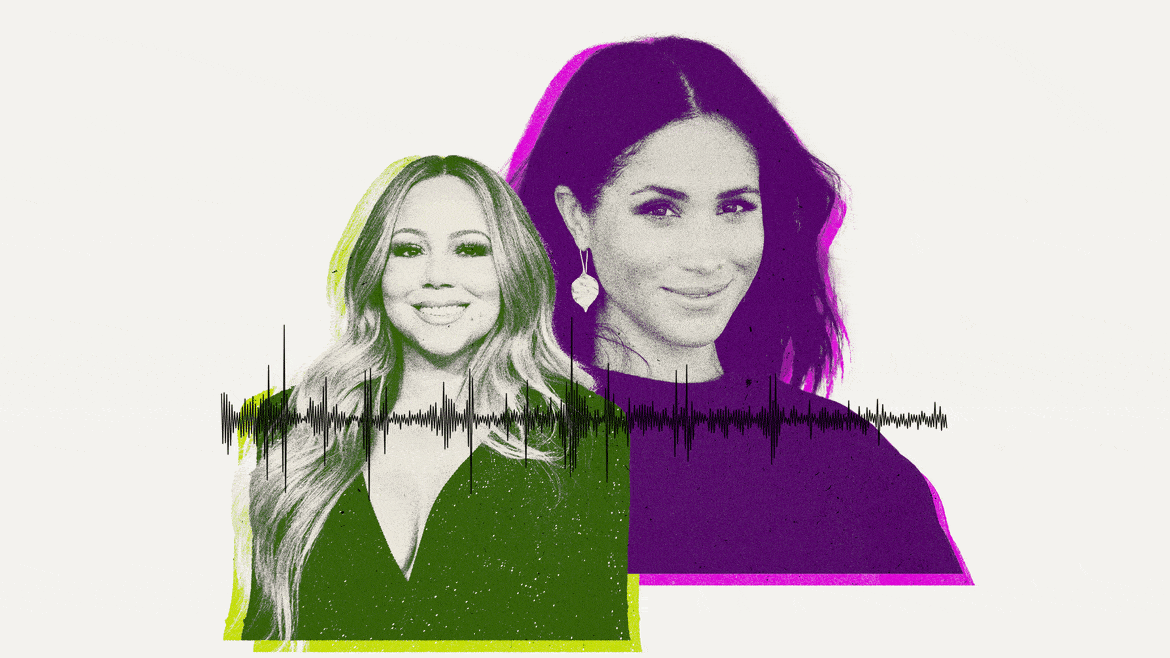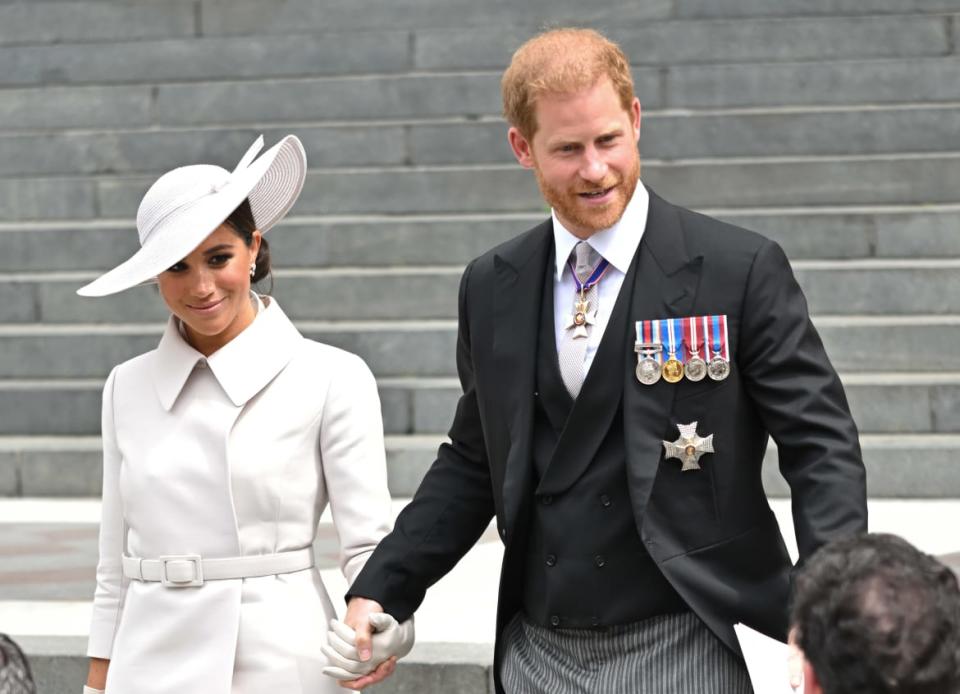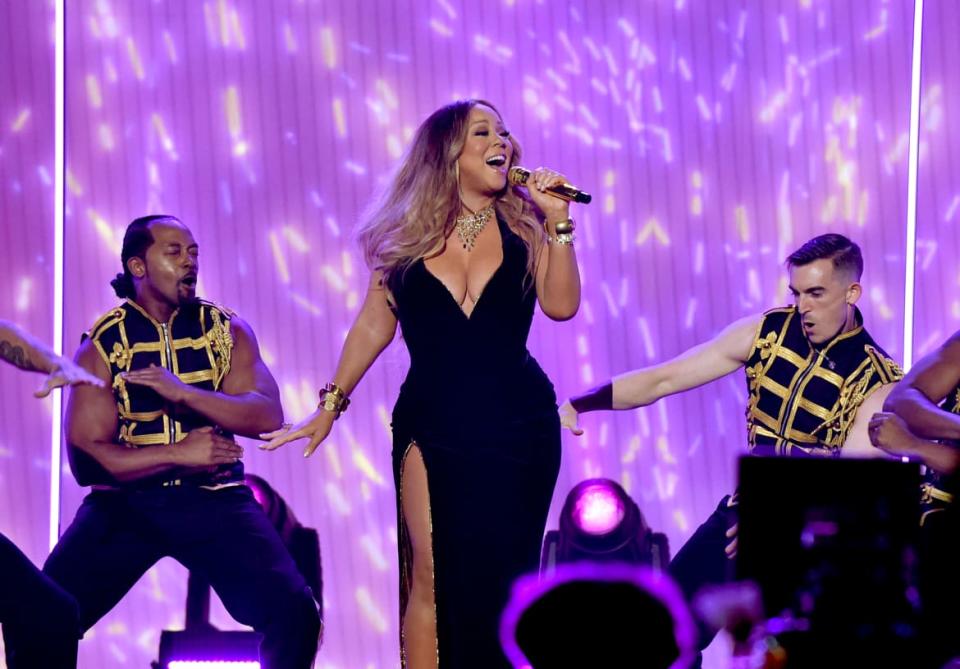Mariah Carey Calls Meghan Markle a Diva, the World Screams

- Oops!Something went wrong.Please try again later.
- Oops!Something went wrong.Please try again later.
- Oops!Something went wrong.Please try again later.
- Oops!Something went wrong.Please try again later.
- Oops!Something went wrong.Please try again later.
Royalist is The Daily Beast’s newsletter for all things royal and royal family. Subscribe here to get it in your inbox every Sunday.
It was a royal summit on Tuesday as the Duchess of Sussex—and current Princess of Podcasting—and the Queen of Christmas (trademark pending) met for a new episode of Meghan Markle’s Archetypes. The podcast premiered last week on Spotify with Serena Williams as the first guest for a discussion about the double standard of female ambition, and its debut topped the streamer’s charts, besting even The Joe Rogan Experience—a cause we can all get behind.
It’s a high bar to meet for Archetype’s second episode, which is probably why Markle brought in the only combination of guest and topic that could do it: Mariah Carey, talking about “the duality of diva.”
Carey’s thoughts on the topic are, of course, paramount. That her delivery of those thoughts is so effervescent—fizzing with personality and humor, but also researched and even emotional—manages to make an otherwise charisma-challenged podcast an electrifying blast to listen to. There’s a moment when Carey flatly rejects Markle’s assertion that being a diva is not something she “can connect to,” and begins teasing the noticeably mortified host, that is worth the price of admission alone. (I don’t know if you have to pay to listen to podcasts, but I’m leaving that turn of phrase.)
Carey’s a natural ham. There are morsels of soundbites and memorable moments that have, over the years, assembled into a veritable feast for fans. But it’s rare for her to participate in such an extended interview.

Markle herself is clearly a fan, too. This podcast episode is a fun, grounding moment for her. I don’t think I previously would have said that I deeply relate to the international lightning rod who is married to Prince Harry, but when Markle giddily narrates every bit of Carey’s “Honey” video, or gushes about what a genius example of campy self-awareness the singer’s MTV Cribs appearance was, I really felt like myself and the woman with the $25 million Spotify deal were one and the same.
The conversation at hand is a fascinating one, and one that we’re obviously fixated on as a culture, as the word “diva” has evolved from a label of admiration to an insult to a caricature—and, maybe now, back again. Who better to discuss the nuance of all that than the legend whose mother was an actual diva, in the original definition as an opera term? Or for whom rumors of unreasonable demands amplified the more successful she became, until she embraced and even winkingly indulged in the reputation?
“I’ve been stuck on this one for a while, because somewhere along the way—and I can’t quite place where—this word ‘diva,’ that actually means ‘goddess’ in Latin, the word just warped,” Markle says at the top of the episode. “It went from high class to high maintenance. From fun, like ‘yes diva’ to ‘ugh, she’s such a diva.’ Today it is so often used to tear a woman down, and it bothers me.”
And then she introduces Carey, who is appearing through a Zoom screen from her home dressed in a shimmering ball gown with canary diamonds dripping down her neck, her ensemble from an awards show the previous night that she claims she woke up in.
If “duality” of the word diva is, as advertised in the episode’s title, what we’re exploring, then I can’t imagine a more appropriate start.
Meghan Markle Says She Was Only ‘Treated Like a Black Woman’ After She Began Dating Harry
The great thing about this format is that it showcases how seriously Carey takes the questions she’s asked, and how important it is for her, as hard as she worked to cultivate a certain kind of celebrity persona, to be honest and considerate about where she came from. She and Markle bond over their experiences growing up mixed race, how it shaped their identities, and how the public’s perception of them changed according to their surroundings and level of fame. (Markle’s revelation that, because she’s light-skinned, the first time she realized there was a real focus on her race was ”when I started dating my husband” was a bombshell, as you can read in the Beast’s Royalist coverage.)
At one point, Markle asks Carey point blank if she considers being called a diva a compliment or a criticism, a topic that, as someone who pores over every Mariah Carey interview like it’s the Bible in seminary school, I don’t think she’s been asked about in that way before.
“I think it’s both,” she says. “I do. Because I know the origin of the word.” After all, she grew up the daughter of an opera singer, a diva by trade. “As things evolved the past 20 years—I don’t know numbers—it became a diva, for me, they mean you’re a successful woman, usually. But also and forgive me if we’re not allowed to say the b-word, but a b-i-t-c-h. It’s not OK For you to be a boss. It’s not ok for you to be a strong woman. You should be diminutive.”
Her relationship to the word, it seems, has changed as often as its connotation. “Because to me it’s so overused now,” she says. “Like, it’s become, ‘She’s the Cupcake Diva!’ I think they use it as a throwaway adjective.”
Of course, there’s a limit to, even when taking this discussion as seriously as they do, really, just how serious to be.
Mariah Carey Now Has Her Own Entrance Music: Let Us Celebrate the Greatest Diva Ever
Markle suggests that because of how Carey grew up, poor and feeling like she didn’t belong anywhere, the behaviors and the glamor that we associate with being a diva were aspirational for her: “Even when it’s being used against you, it almost feels like there were moments where you played into it, because it does feel like it is a defense mechanism and a coat of arms. You’re like I am going to own this, but it’s also a sign of success based on how you associated it from where you came from.”
“I agree with you,” Carey says. “But I think on top of that it’s also for laughs, as me and my fans say. Half of it is just for laughs.” They both start cackling.
Markle revisits the idea of whether or not this is a persona that Carey is putting on repeatedly, before delivering the aforementioned, fateful line that being a diva is “not something I can connect to…” There was more to the thought, but Carey cut her off uproariously: “You give us diva moments, sometimes, Meghan. Don’t act…” Listening at home, I let out a scream that traveled Carey’s full five-octave range.

To start, I can’t think of a more diva move than to announce that you can’t relate to being a diva, let alone as one of the most famous women in the world hosting her own Spotify podcast that booked Serena Williams and Mariah Carey for your first two episodes. Carey is right to interrupt that delusion as quickly as she stopped that back-up singer who was singing her part that one time.
Markle’s narrative is that of the diva—and in all the positive ways that she and Carey had just spent 45 minutes explaining. She claims her power, is a disruptor, is often marginalized but refuses to settle, and has a legion of fans who fawn over her every move. It’s not diva behavior in the way of Miss Piggy, but in the modern sense that this podcast is celebrating.
She was a little-know TV actress who married an actual prince—a hot-as-hell, mischievous one, at that. Then she convinced him that royal life wasn’t best suited for them, breaking centuries of tradition and sparking a veritable international crisis. She tailored her celebrity as a royal to the way she wanted it to be, not to fit snugly into a prescribed agenda that betrayed who she was.
Her rebuttal of Piers Morgan sparked a petulant preoccupation, a warpath that she greets with a silent indignation that only exacerbates his annoyance. She is unfiltered in every way that a diva should be; she trashed the royal family to Oprah Winfrey, and has doubled down, refusing to give into intimidation. She’s created a voice for herself, and now has a podcast to expand its reach. Sure, she’s at heart, I’m sure, a humble mom and a loving wife. But she’s also living a fabulous life with multiple, complicated roles—roles that she has figured out how to play to a T.
If anything, Markle has been instrumental in giving the 'diva' label its newest, empowering meaning—as she and Carey so passionately discuss. Thanks especially to Carey’s refusal to let that comment slide, the podcast seems to arrive at the idea of the word as something to be reclaimed: to be proud of and, more, to play with.
“I don’t want to be a person who’s a one-note person. That’s not festive. It’s not fun,” Carey says. “I’m not looking for a pedestrian! Why? I know, I go a little over the top. But I think that’s allowed. I think in this era, it’s OK. We’ll all be fine.”
Keep obsessing! Sign up for the Daily Beast’s Obsessed newsletter and follow us on Facebook, Twitter, Instagram and TikTok.
Get the Daily Beast's biggest scoops and scandals delivered right to your inbox. Sign up now.
Stay informed and gain unlimited access to the Daily Beast's unmatched reporting. Subscribe now.

